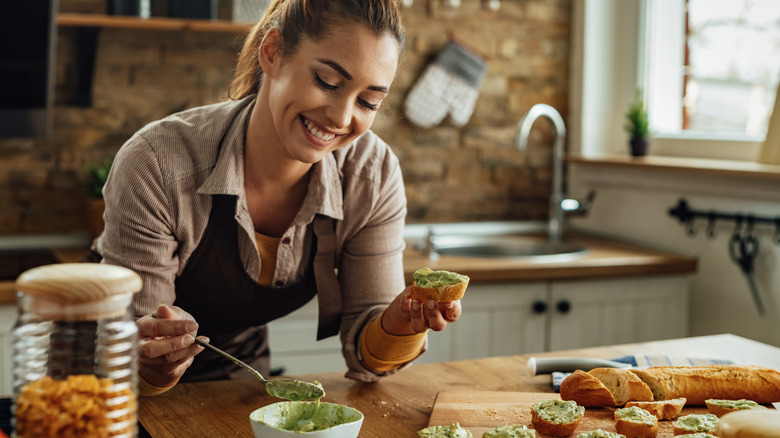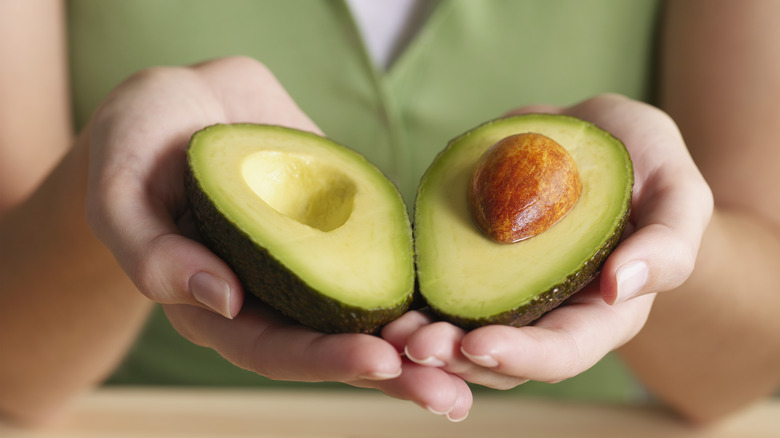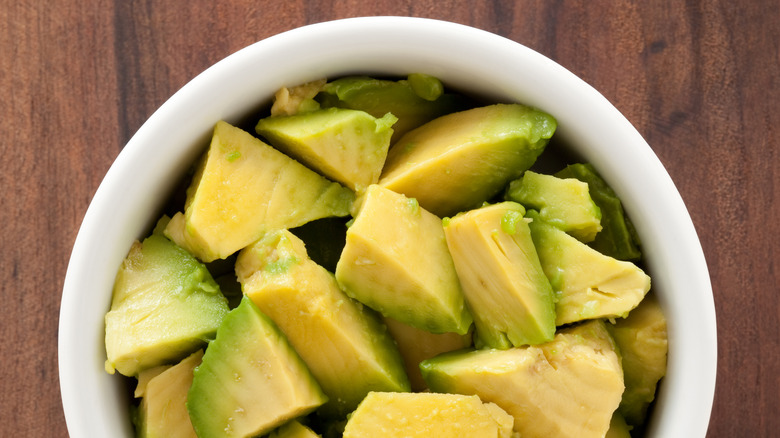When You Eat Avocado Every Day, This Is What Happens To Your Poop
They can be prepared either sweet or savory and they make great additions to salads, smoothies, and your morning toast — we're referring to avocados, native to south-central Mexico, now largely produced in California, Florida, and Hawaii.
Whether you're a first-time avocado eater or you've been enjoying this rich, creamy, and tasty fruit in your diet for years, it's not uncommon to wonder what happens to you when you start eating more avocados. One particular area in which you'd notice change is your poop. Turns out, avocados contain a few ingredients that make it easier for you to have healthy bowel movements.
For starters, avocados have a lot of fiber — one cup of this cubed fruit has as much as 10 grams of total dietary fiber. Fiber adds bulk to your stool and also softens it — both of which aid healthy poop habits. Furthermore, avocados are a rich source of magnesium (43.5 milligrams in a cup) and potassium (728 milligrams). Magnesium is thought to be an osmotic laxative — a mineral that helps draw water to your stool and soften it and potassium helps transport signals from your brain to your digestive system.
Other ways avocados can affect your poop and gut health
Your poop color can be influenced by what you eat and avocados are one of those foods that can turn your stools green. Other foods that can cause green poop include leafy greens, matcha, herbs, apples, green grapes, and green food coloring.
Additionally, avocados are considered great for your gut health, per a 2021 study published in The Journal of Nutrition, which assessed the blood, urine, and fecal samples of 163 overweight but otherwise healthy adults between 25-45 years of age, after a 12-week period where one group had avocados daily and the other didn't. The researchers found that those who consumed this fruit every day had a greater concentration of gut microbes that support gut health and help break down fiber. These participants also had higher microbial diversity. Your poop health is closely related to your gut health so it's not difficult to see why avocados should be on your list of foods if you're dealing with constipation.
As for what happens to the rest of your body when you eat avocado every day, you will be full for longer owing to the fruit's high content of fiber and healthy fats and you will help your body absorb other helpful nutrients like vitamins A, D, E, and K. The antioxidants in avocados fight inflammation, protect your eyes, and combat cancer. Plus, the saponins in avocados could provide relief from osteoarthritis symptoms, the folate levels could help with depression, and the beta-sitosterol in the fruit can help maintain healthy cholesterol levels.
How to include avocados in your diet without overdoing it
Impressive poop health benefits aside, it's important to understand what happens when you eat too much avocado. The fruit is considered a high-fat (and therefore high-calorie) food, so it's relatively easy to undo any weight loss goals you may have had if you consume avocado in excess.
Avocados are also considered a higher FODMAP food, owing to their sorbitol content. This could be problematic for some people with digestive issues like irritable bowel syndrome or IBS. They might experience abdominal discomfort, bloating, and diarrhea.
Something else to keep in mind with avocado consumption is the fruit's potassium content. This could cause issues for someone on blood-thinning medication.
There is such a thing as an avocado allergy too. People who've been diagnosed with latex-fruit syndrome or oral-allergy syndrome or those who could possibly react negatively to the fruit's high histamine content should be mindful. Plant-based foods like avocado, banana, and kiwifruit can be problematic for some people with latex-fruit syndrome.
The expert recommendation for how much avocado you should eat seems to fall at one-half to one whole avocado a day. You shouldn't be adding too many of them to your smoothies or sitting down with a huge bowl of guacamole and chips in front of the TV.
Avocados are also notorious for going bad in a matter of days. Store them whole (and away from other fruits) on your countertop for up to five days or put them in the refrigerator in an air-tight container if you feel like they're ripening too fast.



